The 7th International Conference on Patient- and Family-Centered Care Showcases PFCC Across the Continuum of Care
|
|
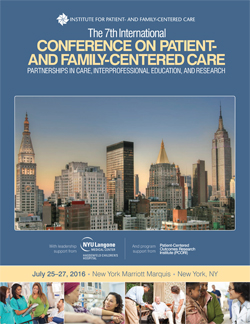 The 7th International Conference on Patient- and Family-Centered Care: Partnerships in Care, Interprofessional Education, and Research, to be held July 25-27, 2016 in New York City, offers multiple sessions, posters presentations, and networking opportunities to strengthen understanding of patient- and family-centered care—and how it can be applied to any setting to enhance the quality, safety, and experience of care for patients and families. Presenters from across the U.S., Canada, and other countries will share best practices and models to expand knowledge, increase skills, and provide new strategies and tools for participants from different health care settings: inpatient and ambulatory/primary care, adults and pediatrics, schools for health professional education, community-based and advocacy organizations, and governmental agencies. The 7th International Conference on Patient- and Family-Centered Care: Partnerships in Care, Interprofessional Education, and Research, to be held July 25-27, 2016 in New York City, offers multiple sessions, posters presentations, and networking opportunities to strengthen understanding of patient- and family-centered care—and how it can be applied to any setting to enhance the quality, safety, and experience of care for patients and families. Presenters from across the U.S., Canada, and other countries will share best practices and models to expand knowledge, increase skills, and provide new strategies and tools for participants from different health care settings: inpatient and ambulatory/primary care, adults and pediatrics, schools for health professional education, community-based and advocacy organizations, and governmental agencies.
In the words of a past participant, “This conference provides best and emerging practice related to patient- and family-centered care, as well as the data showing how PFCC and patient engagement positively impact the outcomes of care.” (D. Wavra, University of Wisconsin Hospital and Clinics)
Register Now for The 7th International Conference on Patient- and Family-Centered Care.
Download Brochure.
With leadership support from:
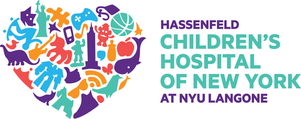
And program support from PCORI
Conference Program Includes Sessions and Posters Featuring Ambulatory and Primary Care
Organizations from CMS to PCPCC, from large health systems to individual practices, from primary care to specialty clinics will share initiatives developed and implemented in partnership with patient and family advisors. A special flyer lists these ambulatory sessions and posters.
|
IPFCC Peer Support Network Website Section Goes Live!
|
 Peer Support—be it one-to-one, a support group, online, or another model—offers accessible, personalized, relationship-based support. Peer support may assist an individual or family coping with a new diagnosis, a traumatic event, or a chronic condition. It may connect isolated individuals with a community of people who understand—a condition, a diagnosis, a sexual orientation. Peer Support offers an essential real-life and real-time perspective. Peer Support—be it one-to-one, a support group, online, or another model—offers accessible, personalized, relationship-based support. Peer support may assist an individual or family coping with a new diagnosis, a traumatic event, or a chronic condition. It may connect isolated individuals with a community of people who understand—a condition, a diagnosis, a sexual orientation. Peer Support offers an essential real-life and real-time perspective.
IPFCC is proud to announce that its Peer Support website section is now live! The intent of this website section is to provide guidance and resources from a sampling of established hospital or clinic-based peer support programs across the United States and Canada. The section highlights a few Exemplar Programs that partner with patients and families to design and implement evidence-based programs. You’ll find resources, such as key success factors, information about delivery models and organizational structures, research, personal stories, and other materials.
Over time, IPFCC will add more information to this website section. We invite peer-to-peer programs—both emerging and well established—to submit responses to IPFCC’s online Questionnaire. Also, consider sharing with IPFCC helpful resources or articles about peer support that can be added to this section. Send inquiries or information to institute@ipfcc.org and please put Peer Support in the subject line.
 A special thanks to Nancy DiVenere, co-founder and past president of Parent to Parent USA, and member of the IPFCC Board of Directors, and Celeste Cas A special thanks to Nancy DiVenere, co-founder and past president of Parent to Parent USA, and member of the IPFCC Board of Directors, and Celeste Cas tillo Lee, former Program Manager for Patient- and Family-Centered Care at the University of Michigan Health System, Adult Services, for spearheading this effort. Both Nancy and Celeste have served as IPFCC seminar and webinar faculty on the subject of peer support. Their knowledge, enthusiasm, dedication, and commitment to this project made this addition possible. tillo Lee, former Program Manager for Patient- and Family-Centered Care at the University of Michigan Health System, Adult Services, for spearheading this effort. Both Nancy and Celeste have served as IPFCC seminar and webinar faculty on the subject of peer support. Their knowledge, enthusiasm, dedication, and commitment to this project made this addition possible.
Read more in the Peer Support website section.
|
Caring for Caregivers and Patients: Research and Clinical Priorities for Informal Cancer Caregiving
|
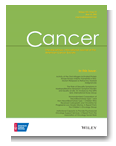 In the recent article, Caring for Caregivers and Patients: Research and Clinical Priorities for Informal Cancer Caregiving, published online in Cancer, the authors* summarize the evidence presented at Caring for Caregivers and Patients: Revisiting the Research and Clinical Priorities for Informal Cancer Caregiving, a two-day meeting convened by the National Cancer Institute and the National Institute of Nursing Research. In the recent article, Caring for Caregivers and Patients: Research and Clinical Priorities for Informal Cancer Caregiving, published online in Cancer, the authors* summarize the evidence presented at Caring for Caregivers and Patients: Revisiting the Research and Clinical Priorities for Informal Cancer Caregiving, a two-day meeting convened by the National Cancer Institute and the National Institute of Nursing Research.
At the meeting, stakeholders shared expertise about “the state of the science of informal cancer caregiving for adult cancer patients and to identify gaps in the science from the perspectives of patients, caregivers, health care providers, and researchers.”
The authors noted that cancer is a “family affair in which many family members and friends serve as informal cancer caregivers” who provide care that is “typically uncompensated” and “involves significant amounts of time and energy for months or years, and requires the performance of tasks that may be physically, emotionally, socially, or financially demanding.”
The authors also include recommendations in each of the following four areas:
- “Improving the estimation of the prevalence and burden of informal cancer caregiving;
- Advancing the development of interventions designed to improve outcomes for cancer patients, caregivers, and patient-caregiver dyads;
- Generating and testing strategies for integrating caregivers into formal health care settings; and
- Promoting the use of technology to support informal cancer caregivers.”
Read the entire article to learn about these and other recommendations for advancing informal cancer caregiver research.
*Kent, Rowland, Northouse, et al. (2016). Cancer. doi:10.1002/cncr.29939. [Epub ahead of print]
|
Improving Trainee Education During Family-Centered Rounds: A Resident’s Perspective
|
In 2003, the Am erican Academy of Pediatrics “deemed family-centered rounds (FCR) to be the standard of care.” FCR is defined as “conducting attending rounds, including patient presentations and discussions, in the patient’s room with nursing and family present.” While it is generally accepted that FCR “has improved multiple aspects of patient care,” and FCR presents “a forum to hone skills such as communication and professionalism,” FCR may pose challenges to teaching as compared to traditional rounding styles. erican Academy of Pediatrics “deemed family-centered rounds (FCR) to be the standard of care.” FCR is defined as “conducting attending rounds, including patient presentations and discussions, in the patient’s room with nursing and family present.” While it is generally accepted that FCR “has improved multiple aspects of patient care,” and FCR presents “a forum to hone skills such as communication and professionalism,” FCR may pose challenges to teaching as compared to traditional rounding styles.
 Stanski and Patel explore these challenges in their review article, Improving Trainee Education During Family-Centered Rounds: A Resident’s Perspective, in the January 2016 issue of Pediatrics. Stanski and Patel explore these challenges in their review article, Improving Trainee Education During Family-Centered Rounds: A Resident’s Perspective, in the January 2016 issue of Pediatrics.
The authors cite the following barriers to the educational process during FCR:
- Trainee fear of appearing less knowledgeable in front of patients and families;
- Trainee fear of sharing sensitive patient information in front of patients and families, such as differential diagnosis;
- Lack of time, given that FCR provides a forum for “direct communication with patients and families” which is “time-consuming but critical”; and
- Attending physician style may impact resident satisfaction with their educational experience.
Strategies the authors suggest to address the barriers include:
- Decreasing the number of team members and the number of patients per team would increase time for teaching;
- Setting of patient and family expectations by the attending physician that FCR is a means for “simultaneous communication” and trainee learning, empowering trainees to share their “clinical impressions more freely, providing opportunities for bedside education”;
- Trainees can play a role in improving the educational value of FCR by asking questions of the attending physician, as appropriate;
- Improve efficiency of FCR; and
- Trainees provide feedback to attending physicians and senior residents about the educational aspects of FCR such as “having mechanisms in place for this type of feedback to occur regularly and without fear of punishment” in order to facilitate continuous improvement of FCR.
IPFCC works with academic medical centers to establish patient- and family-centered rounds. Free resources, such as Applying Patient- and Family-Centered Concepts to Bedside Rounds, Bedside Rounds Bibliography, and Videos on Bedside Rounds are available on IPFCC’s website.
|
Primary Care Corner ~ Pediatric Coordinated Care Clinic, MassGeneral Hospital for Children
|
|
 The Pediatric Coordinated Care Clinic at MassGeneral Hospital for Children (MGHfC) provides a variety of important services to families of children with complex health care needs. The Clinic began in 2006 and, last year, served more than 170 infants, children, adolescents, and their families from Massachusetts, Maine, New Hampshire, Rhode Island, New York, and outside the United States. The Pediatric Coordinated Care Clinic at MassGeneral Hospital for Children (MGHfC) provides a variety of important services to families of children with complex health care needs. The Clinic began in 2006 and, last year, served more than 170 infants, children, adolescents, and their families from Massachusetts, Maine, New Hampshire, Rhode Island, New York, and outside the United States.
The Clinic is an inspiring example of how patient and family partners can truly transform care. Sandy Clancy’s son Jack died in September 2004 of a rare fatal disease. During the 8-9 month period of his illness, Jack spent time in the hospital but also at home. Sandy remembers wishing there had been “one person to call, one physician who was the leader—one quarterback of the team.” Essentially, Sandy coordinated her son’s care and served as the liaison between different specialists. “I sometimes felt that I held all the health information about Jack, while the providers each had pieces.” Sandy also spent hours negotiating with medical supply companies, pharmacists, and insurance companies.
After Ja ck’s death at age 5, Sandy and her husband met with MassGeneral’s Chief of Pediatrics and shared their frustrations about the lack of continuity of care for children with complex medical needs who are outpatients. Sandy talked about the difficulty of being both a mother and a care manager. The Chief of Pediatrics promised Sandy that they would “find a remedy for this problem.” Sandy insisted that she wanted to be part of the remedy—of the change. ck’s death at age 5, Sandy and her husband met with MassGeneral’s Chief of Pediatrics and shared their frustrations about the lack of continuity of care for children with complex medical needs who are outpatients. Sandy talked about the difficulty of being both a mother and a care manager. The Chief of Pediatrics promised Sandy that they would “find a remedy for this problem.” Sandy insisted that she wanted to be part of the remedy—of the change.
With that impetus, MassGeneral not only began developing its Pediatric Coordinated Care Clinic but also hired Sandy to be the Clinic’s first Manager in 2006; she is still in that position. Sandy says that her own experience as the mother of a child with complex needs has “informed and shaped” her insights for designing the Clinic’s services.
Sandy offers the following advice to other patient/family advisors beginning to partner with staff members in primary/ambulatory care, “There is enormous power and possibility for transformation in, straightforwardly, sharing one’s experiences and being open to engaging in dialogue with staff and leadership about solutions. The goal—always—is to change systems of care.”
~~~~~~~~
IPFCC is partnering with the Patient-Centered Primary Care Collaborative (PCPCC) as part of its Transforming Clinical Practice Initiative (TCPI) Support and Alignment Network (SAN).
If you are already partnering with patients and families to improve primary or ambulatory care and want to share your successes, or you want to learn more, IPFCC hosts a free online learning community for Primary and Ambulatory Care Partnerships on its PFAC Network. For more information about joining, please contact Mary Minniti at mminniti@ipfcc.org or sign up on IPFCC's PFAC Network.
|
|
|
- The 7th International Conference on Patient- and Family-Centered Care Showcases PFCC Across the Continuum of Care
- IPFCC Peer Support Network Website Section Goes Live!
- Caring for Caregivers and Patients: Research and Clinical Priorities for Informal Cancer Caregiving
- Improving Trainee Education During Family-Centered Rounds: A Resident’s Perspective
- Primary Care Corner ~ Pediatric Coordinated Care Clinic,
MassGeneral Hospital for Children
- IPFCC Webinars
- The Importance of the Patient Experience in Quality Improvement
- IPFCC's Intensive Training Seminar is Coming to San Antonio, Texas ~ November 16-18, 2016
- Video From the Field ~ Patient and Family Advisory Councils
|
Upcoming IPFCC Webinars
|
|
Developing and Maintaining a Peer Mentor Program
June 16, 2016
 Join Stacy Brand, MBA, Outreach Manager for the Transplant Center at the University of Michigan Health System (UMHS) in Ann Arbor, Michigan, and Cedric Clark, Kidney Transplant Peer Mentor for the UMHS Transplant Join Stacy Brand, MBA, Outreach Manager for the Transplant Center at the University of Michigan Health System (UMHS) in Ann Arbor, Michigan, and Cedric Clark, Kidney Transplant Peer Mentor for the UMHS Transplant Center, to learn about how the UMHS Transplant Center created a peer mentor program and partnered with the UMHS Patient and Family Centered Care Program to develop a standardized peer mentor training for all departments. Successes and challenges of creating and sustaining a program—including developing, training, and managing peer mentors—will be discussed. Center, to learn about how the UMHS Transplant Center created a peer mentor program and partnered with the UMHS Patient and Family Centered Care Program to develop a standardized peer mentor training for all departments. Successes and challenges of creating and sustaining a program—including developing, training, and managing peer mentors—will be discussed.
Leveraging the Principles of High Reliability to Advance Patient and Family Engagement in Safety
June 29, 2016
 Join Juliette Schlucter, Director, The Center for Child and Family Experience, Sala Institute for Child and Family-Centered Care, NYU Langone Medical Center and Fiona Howard Levy, MD, Executive Director, Sala Join Juliette Schlucter, Director, The Center for Child and Family Experience, Sala Institute for Child and Family-Centered Care, NYU Langone Medical Center and Fiona Howard Levy, MD, Executive Director, Sala Institute for Child and Family Centered Care, NYU Langone Medical Center. This webinar will outline two important frameworks that organizations have used successfully—high reliability and patient and family-centered care—to advance patient and family engagement in safety. Institute for Child and Family Centered Care, NYU Langone Medical Center. This webinar will outline two important frameworks that organizations have used successfully—high reliability and patient and family-centered care—to advance patient and family engagement in safety.
Applying Patient- and Family-Centered Concepts in Dealing with Challenging Situations with Patients and Families
July 13, 2016
 Terry Griffin, RNC, MS, NNP Terry Griffin, RNC, MS, NNP
More information and registration coming soon.
IPFCC’s webinars are a cost-effective educational resource. Cost is per line, so a group of any size can participate from the same location on one line. Handouts and supplemental resources are included with registration. Want people to participate from more than one location? IPFCC offers a discount for additional lines.
Learn more about webinar faculty, learning objectives, and Pinwheel Sponsor discounts.
|
The Importance of the Patient Experience in Quality Improvement |
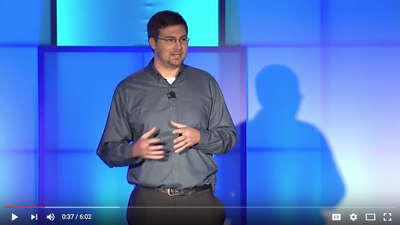
Soon-to-be-Dad, Nathan Hunkins, wakes up from a six-hour operation on his right hand which he severely injured in a fall, to hear, as the doctors said, both the good news and the bad. The surgeons made a complete repair, but Nathan learned that often such injuries result in loss of function of the hand. The great emotional pain he suffered during his months of recovery, far exceeded his physical suffering. Watch Hunkins tell his story, Will I Be Able to Hold My Newborn Daughter, in a Spotlight Talks, Snapshots of the Aligning Forces Story, Aligning Forces for Quality (AF4Q), funded by the Robert Wood Johnson Foundation.
Nathan’s story shows the true impact of “patient engagement” on improving health, when patients and families have the courage to provide feedback and when the providers are willing to listen and to act based on that feedback. According to Nathan, “the relationship between a patient and a provider is a missing piece, an untapped resource, which if utilized more often can lead to significant improvements in health and health care…The best health care systems in the future will embrace patient feedback and incorporate it into their quality improvement systems.”
|
IPFCC's Intensive Training Seminar is Coming to San Antonio, Texas ~ November 16-18, 2016 |
IPFCC 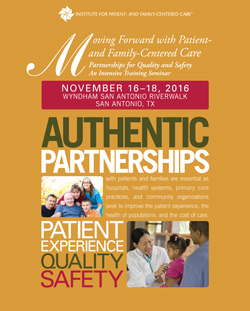 is thrilled to announce that its Moving Forward with Patient- and Family-Centered Care: Partnerships for Quality and Safety ~ An Intensive Training Seminar will be in San Antonio, Texas, November 16-18, 2016. is thrilled to announce that its Moving Forward with Patient- and Family-Centered Care: Partnerships for Quality and Safety ~ An Intensive Training Seminar will be in San Antonio, Texas, November 16-18, 2016.
The seminar will be held at the Wyndham San Antonio Riverwalk,
offering attendees easy access to the best of San Antonio, such as The
Riverwalk, The Alamo, Historic Market Square, San Antonio Museum of Art,
the Majestic Theatre, and much more.
Although online
registration for the seminar is not yet available, attendees may make
hotel reservations at the Wyndham San Antonio Riverwalk. The seminar
group rate of $139 is available until October 21, 2016. To make hotel
reservations, go online
or contact the hotel at 866.764.8536 and indicate that you are with the
IPFCC Seminar in order to receive the special group rate.
For
planning purposes, the opening plenary session begins at 8:15 am on
Wednesday, November 16, and the seminar ends at 12:00 pm on Friday,
November 18. Participants should plan to arrive by Tuesday and leave on
Friday afternoon, after the seminar concludes—or extend your stay if you
would like to enjoy more of what San Antonio has to offer, before or
after the seminar.
|
Video From the Field ~ Patient and Family Advisory Councils |
|
 CHI Health, formerly Catholic Health Initiatives, produced a video, One of the Many Ways We Listen to Patients. It is a behind-the-scenes look at one Patient Family Advisory Council (PFAC) at CHI Health Creighton University Medical Center. CHI has “dozens [of PFACs] operating” in Nebraska and Iowa at “hospitals, cancer centers, clinics, nursing homes, etc. The councils are made up of CHI employees and an equal number of patients, family members, and other members of the community.” Watch the video to learn more. CHI Health, formerly Catholic Health Initiatives, produced a video, One of the Many Ways We Listen to Patients. It is a behind-the-scenes look at one Patient Family Advisory Council (PFAC) at CHI Health Creighton University Medical Center. CHI has “dozens [of PFACs] operating” in Nebraska and Iowa at “hospitals, cancer centers, clinics, nursing homes, etc. The councils are made up of CHI employees and an equal number of patients, family members, and other members of the community.” Watch the video to learn more.
|
Links
|
|
|
Previous Issues |
|
|
About Us
|
| Founded in 1992 as a nonprofit organization, the Institute for Patient- and Family-Centered Care (IPFCC) works to advance the understanding and practice of patient- and family-centered care in all settings where individuals and families receive health care. |
|